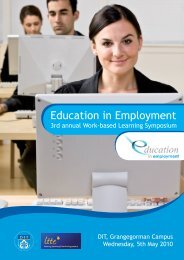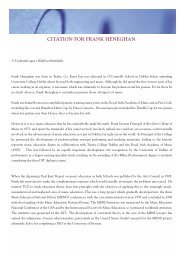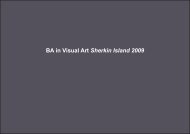TWICE THE SIZE - DIT Update - Dublin Institute of Technology
TWICE THE SIZE - DIT Update - Dublin Institute of Technology
TWICE THE SIZE - DIT Update - Dublin Institute of Technology
Create successful ePaper yourself
Turn your PDF publications into a flip-book with our unique Google optimized e-Paper software.
3 CHANGING IRELAND – <strong>THE</strong> CONTEXT<br />
“Continuous discontinuity, constant change, is our shared condition.” (Zygmunt Bauman, 2002)<br />
Since the start <strong>of</strong> the 1990s, Ireland has experienced an unprecedented era <strong>of</strong> growth and has<br />
undergone pr<strong>of</strong>ound transformations in all areas <strong>of</strong> life. The transition from being a poor nation<br />
on the periphery <strong>of</strong> Europe with a weak economy and soaring unemployment, to a country with<br />
high economic growth, full employment, continued population growth and generally regarded as<br />
being a ‘success model’ for the new EU member countries can be attributed to an interaction <strong>of</strong><br />
various internal and external factors. Of particular note, however, was Ireland’s laissez-faire<br />
approach to industrial policy during a period <strong>of</strong> global economic restructuring (O’Hagan, 1995).<br />
The economic transformation, largely based on the pursuit <strong>of</strong> the high-tech FDI development<br />
model, resulted in the formation <strong>of</strong> new spatial and social realities – a new geography <strong>of</strong><br />
Ireland. In this chapter, under three headings: places, people and potential, an attempt is made<br />
to depict some <strong>of</strong> the pieces <strong>of</strong> the complex puzzle that Ireland became and provide a broader<br />
context for its journey into the future.<br />
3.1 Places<br />
This section discusses the most recent developments in concepts and theories in economic<br />
geography, reviews the evolution <strong>of</strong> past spatial policies and patterns in Ireland, and finally, it<br />
explores the current spatial trends in the European Union and Ireland.<br />
3.1.1 Space and Economy<br />
Local and regional development has become an increasingly important activity for governments<br />
at all levels across the world since the 1960s and 1970s. In parallel, the context for local and<br />
regional development has been dramatically transformed by the changing patterns <strong>of</strong> economic<br />
activity, and become far more challenging. The economic system has grown to be more<br />
internationalised, knowledge intensive and competitive. Its contemporary global form is<br />
characterised, among other things, by a deepened unevenness in the prospects for development<br />
for particular social groups and territories, and clearer geographical inequalities in prosperity<br />
and well-being.<br />
At both global and national scales only a limited number <strong>of</strong> localities and regions seem to be<br />
reaping the benefits arising from new opportunities provided by the processes <strong>of</strong> globalisation.<br />
In general, successful regions tend to be those that have something distinctive to <strong>of</strong>fer to<br />
markets that expand beyond the traditional realm <strong>of</strong> the local and regional spheres. Pike,<br />
Rodriguez-Pose & Tomaney (2006) have identified three types <strong>of</strong> ‘winning regions’.<br />
Large metropolitan regions. Large urban agglomerations attract many high value-added<br />
service activities, such as business, financial, real estate and insurance services, as well<br />
as the headquarters <strong>of</strong> corporations (Taylor & Walker 2001). The economies <strong>of</strong><br />
agglomeration derived from such concentration <strong>of</strong> production factors, in consequence,<br />
draw research and development, and design activities (Scott & Storper 2003).<br />
39








